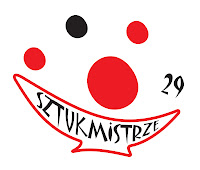LECTURES - PRELEGENTACH
socio-cultural dimension of teaching circus
Maria Nowicka (Poland). A longtime organizer of cultural activities, a graduate of Warsaw University, MA in Social Pedagogy, an employee of the Centre for Cultural Animation and the National Cultural Centre, an honorary member PSPiA KLANZA, originator and propagator methods of teaching circus in Poland, co-organizer of the first Polish-German workshop on methodology of teaching circus (Dr ü ber, Germany).
Eve Dembek (Poland). Circus and drama educator, active cultural animator, director and theater and dance instructor, director Brodnickie House of Culture. The founder of a group of circus "fun" (More than 10 years) and a group of Lipinek circus "Bedekuś from Brodnica. As a
of Poland's first began working with children and youth with using the methods of teaching the circus. Initiator and organizer of the Festival Theatre Brodnicka Feast - BUT "and the" International Children's Circus Meeting (this year for the eleventh time.) Executor of the many artistic projects (including international).
Ilya Landsberg (Germany). Switch, performer and specialist in educational games, teacher of circus two decades of experience in the work by the circus pedagogy with teachers, volunteers and therapists. Organiser and co-organizer of several projects and circus festivals, cultural and artistic activities, including international youth exchanges. For many years, is actively working with Klanza.
Jon Skjerning- Rasmussen (Denmark). Switch and performer, For over 15 years of experience in juggling, circus teacher, 3 years president of the European Juggling Association (EJA).
conducts workshops and training for educational institutions and business in Europe. At work with the other stresses the value of a learning process, self-control, self-control skills. As president of EJA focuses on creating and developing community juggling clubs and multi-cultures.
Monika Kalinowska (Poland). Educator, coach second degree PSPiA KLANZA, teacher at Primary School No. 29 in Lublin, where since 2005 he teaches circus for the students. Conference organizer "Pedagogy of the circus in the education and upbringing (2007r.). Initiator of the creation of many circus groups in Poland, Russia and Ukraine. Since 2005 - the coordinator of the Polish-German projects on the use of methods of teaching circus in working with groups.
dimension of pedagogical and psychological benefits of teaching circus
Prof. Peter. J. Beek (Netherlands, VU University Amsterdam). Master's degree (1985) and Ph.D. (1989) obtained at the Department of Human motility at the University of in Amsterdam, where he became a professor of Department of Coordination, now also serves as dean. Coordination (ie control the organization of human organs in motion), its development during the physical development, learning and rehabilitation is a major area of \u200b\u200bresearch J. Beek 'a. This includes a number of topics (coordination bimanualna, the connection between perception and action, motor learning and expertise, posture, grasping, reaching, catching). Prof. Beek wants to implement the conclusions of their research to clinical research on the pathology of motility in a selected group of patients, including patients with Parkinson's disease, to diagnosis, rehabilitation, and to facilitate daily life in this group of patients. Since 1999, the editor of Human Movement Scence, multidisciplinary magazine about motor control and learning.
Dr. John Scholz (England, Oxford Centre for Functional MRI of the Brain (FMRIB), University of Oxford
). works at the Oxford Centre for Functional Magnetic Resonance Imaging (FMRIB), University of Oxford. FMRIB Centre is a multidisciplinary research center neuroimaging, which focuses on the use of magnetic resonance imaging (MRI)
and related technology in neurological research. Interest research group, which is working, including stroke rehabilitation in Poland, changes in white matter disease, infected, and learning and plasticity in the motor system, possible changes in the adult brain in response to the learning process.
Dr. Paul Fortuna (Poland). Psychologist, an experienced trainer and coach. Lecturer at the Leon Kozminski Academy in Warsaw and the Institute of Psychology, Catholic University of Lublin John Paul II. He specializes in cognitive conditions change attitudes and behavior. Author five books and numerous articles on social psychology and personal development.
Miroslav Urban (Poland). P sycholog, d oradca Pro, coach, juggling enthusiast. Creator own program Inspiration Juggling , using the metaphor of juggling
in education and business. A utor many studies concerning the impact on the art of juggling with human psychophysical functioning. P Representative of the European Żonglerskiego Association (EJA)
Poland. The leader of an international group of "Benefits of Juggling" with EJA. The initiator of claim
to host the European Convention on juggling in 2012 in Lublin.
Eve Leg (Poland). Coach Grade II PSPiA KLANZA, supervisor, educator, sociotherapist, author of methodological and cognitive skills development workshops the participants work with the teaching environment of Ukraine and Lithuania. Since 2010. KLANZA president of the Association, who promotes the idea of \u200b\u200bcreating a Centre of Science in Lublin















